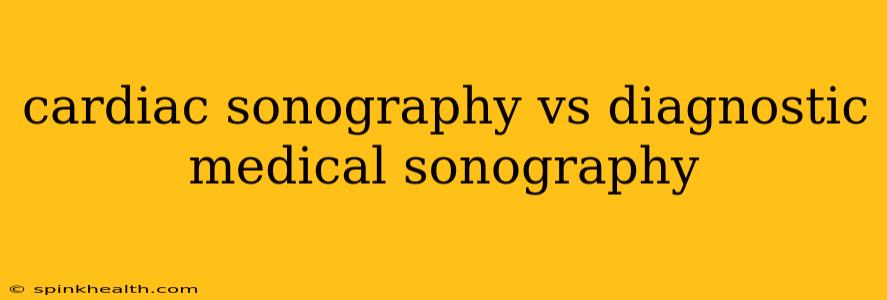Cardiac Sonography vs. Diagnostic Medical Sonography: Unveiling the Differences
The world of medical sonography is vast, encompassing a wide range of specializations. Two prominent areas often spark confusion: cardiac sonography and diagnostic medical sonography. While both utilize ultrasound technology to create images of internal organs and structures, they differ significantly in their focus, required skills, and career paths. Let's unravel the distinctions through a captivating story.
Imagine two skilled sonographers, Anya and Ben. Anya is a cardiac sonographer, while Ben is a diagnostic medical sonographer. Their journeys, while both rooted in ultrasound, take vastly different routes.
Anya, with her keen eye for detail and a deep understanding of the cardiovascular system, specializes in creating images of the heart. Her workday might involve performing echocardiograms, assessing heart function, identifying abnormalities like valve disease or congenital defects, and assisting cardiologists in diagnosing and managing heart conditions. Anya's work is incredibly precise and demands a thorough knowledge of cardiac anatomy, physiology, and pathology. She needs to understand the intricate dance of the heart’s chambers, valves, and blood flow to interpret the images accurately. One particularly challenging case involved a patient with a subtle but critical valve leakage; Anya’s expertise allowed for early detection and intervention, potentially saving the patient's life.
Ben, on the other hand, is a generalist in the world of diagnostic medical sonography. His expertise spans a broader range of anatomical areas. One day, he might be imaging an abdomen to assess the liver and gallbladder, and the next, he could be examining a pregnant patient's uterus to monitor fetal development. Ben's work requires a strong foundational knowledge of anatomy and physiology, but the depth of his specialization in each area is less than Anya's focus on the heart. His day might also involve performing vascular ultrasounds, examining blood vessels for blockages or abnormalities. A recent case involved a patient presenting with abdominal pain. Ben’s skill in abdominal sonography quickly pinpointed the cause—gallstones—allowing for prompt treatment.
This brings us to the key differences:
What is Cardiac Sonography?
Cardiac sonography, also known as echocardiography, is a specialized area focusing exclusively on the heart. Cardiac sonographers require a deeper understanding of cardiac anatomy, physiology, and pathology than general diagnostic medical sonographers. They are highly skilled in performing various echocardiographic techniques to assess heart function, structure, and blood flow.
What is Diagnostic Medical Sonography?
Diagnostic medical sonography is a broader field encompassing various organ systems. While a diagnostic medical sonographer may possess some knowledge of cardiac ultrasound, their expertise isn't as deeply specialized as a cardiac sonographer's. They may perform ultrasounds on numerous body parts such as the abdomen, pelvis, breast, musculoskeletal system, and vascular system.
What are the Career Paths?
Both careers offer rewarding opportunities. However, the path for cardiac sonography usually involves further specialized training after completing a general sonography program. This could involve additional certifications or fellowships. Diagnostic medical sonographers can choose to specialize further in specific areas of the body, but the initial training is more comprehensive, covering a wider range of applications.
What are the Educational Requirements?
Both typically require an associate's or bachelor's degree in diagnostic medical sonography. Cardiac sonography often necessitates additional certifications and specialized training following the completion of a general program.
What skills do I need for cardiac sonography vs. diagnostic medical sonography?
Cardiac Sonography: Requires exceptional anatomical knowledge of the heart, strong critical thinking skills to interpret complex images, and the ability to work effectively with cardiologists.
Diagnostic Medical Sonography: Demands a broad understanding of anatomy and physiology across multiple body systems, adaptability to different imaging techniques, and the ability to communicate effectively with patients and referring physicians.
Which is better for me?
The "better" choice depends on your individual interests and career goals. If you have a passion for cardiology and a desire for deep specialization, cardiac sonography is an excellent path. If you prefer a broader scope of practice and enjoy variety, diagnostic medical sonography might be more suitable. Both fields offer excellent job prospects and opportunities to make a real difference in patients' lives.
This story of Anya and Ben highlights the key differences between these two vital roles in the medical field. Both cardiac and diagnostic medical sonographers play critical roles in patient care, utilizing the power of ultrasound to improve diagnoses and treatment strategies. The choice between the two ultimately comes down to individual interests and professional aspirations.

